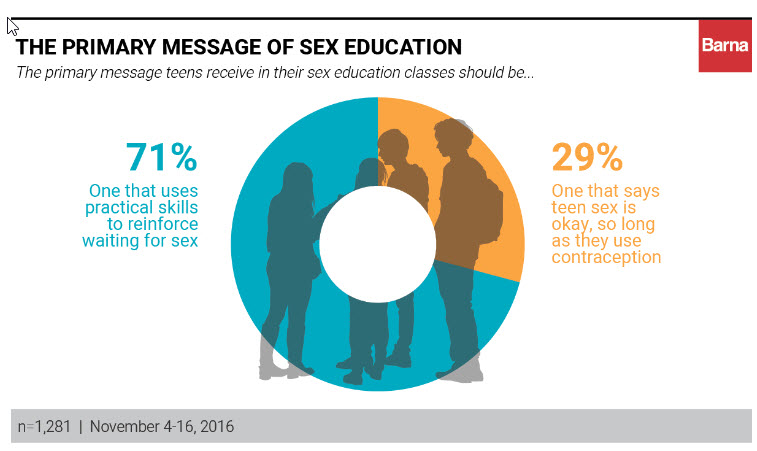Should Sex Ed Teach Abstinence? Most Americans Say Yes
 Barna 5 September 2017
Barna 5 September 2017
Family First Comment: Abstinence expects the best – and leaves nothing to ‘chance’!
When asked whether they personally believe it’s OK for teens to have sex, assuming the sex is consensual and a contraceptive is used, 37 percent of all adults affirm such sexual activity among teens—and males much more so than females (46% and 28%, respectively). Sexual behavior is a topic on which generations predictably disagree, and Millennials really stand apart. Among Millennials, more than half (54%) feel consensual, safe sex among teens is OK.
While seven in 10 adults (71%) believe sex education classes should primarily use practical skills to reinforce waiting for sex, a smaller majority of Millennials agree (57%). This compares to much higher rates among Gen X (74%), Boomers (75%) and Elders (85%). The other 43 percent of Millennials believe sex education should communicate that teen sex is OK, so long as young people consent and use contraception. Overall, only 29 percent of adults agree with this approach. Additionally, Millennials (38%) are more likely to say federal funding should be used to support this point of view compared to Boomers (9%) and Elders (6%).
Family Status Shapes Perspectives
Those with children under 18 (77%) strongly believe sex education should support a message of waiting, while those without minor children still favor this idea albeit to a lesser degree (68%). Even so, parents who are actively raising children are more likely to say teen sex is OK (48% vs. 31% of those not raising children). Given that Millennials and Gen X are most likely to currently have children under 18, these statistics indicate that young parents may struggle with the tension between their broader progressive values and a desire for their own children to be selective.
Married people (80%) and those who have been divorced (76%) are most likely to say the primary message of sex education should reinforce waiting, in contrast with the 57 percent of those who have never been married and 58 percent of those who have ever cohabited. Nearly all married (91%) and divorced (92%) people also believe it’s at least somewhat important that teens be encouraged to avoid sex. Among those who have never been married, three-quarters (73%) agree. It’s possible the experience of commitment in marriage fosters a less lenient view of sexuality, or that holding stringent perspectives encourages people to pursue marriage.
Faith Influences Sex Education Approaches
Faith is the single most powerful factor influencing adults’ views of teen sex and sex education. When asked what primary message sex education classes should offer, 78 percent of self-identified Christians and 86 percent of practicing Christians agree it should be a message that uses practical skills to reinforce waiting for sex. By comparison, 52 percent of non-Christians agree. The group most enthusiastic about this approach is evangelicals, with 94 percent in agreement. Church activity makes a difference as well. Among weekly church attenders, 84 percent agree that sex education should encourage teens to wait. This presents a marked contrast with those who attend monthly (79%) or less often (63%).
READ MORE: https://www.barna.com/research/sex-ed-teach-waiting-say-yes/?utm_source=Barna+Update+List&utm_campaign=4282c6a738-EMAIL_CAMPAIGN_2017_09_5&utm_medium=email&utm_term=0_8560a0e52e-4282c6a738-172178989&mc_cid=4282c6a738&mc_eid=60396d5a96







